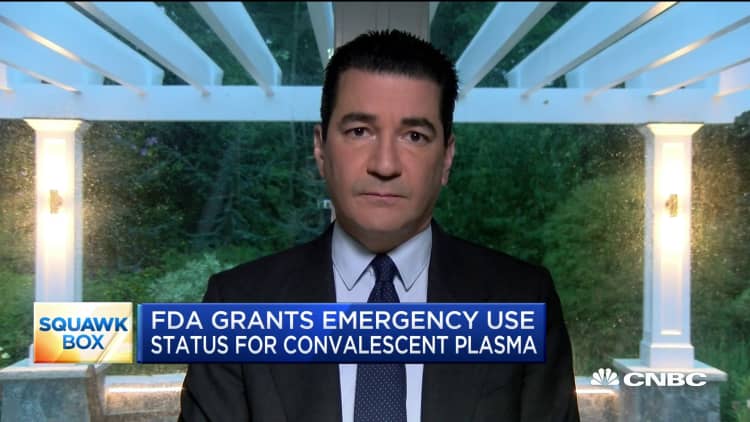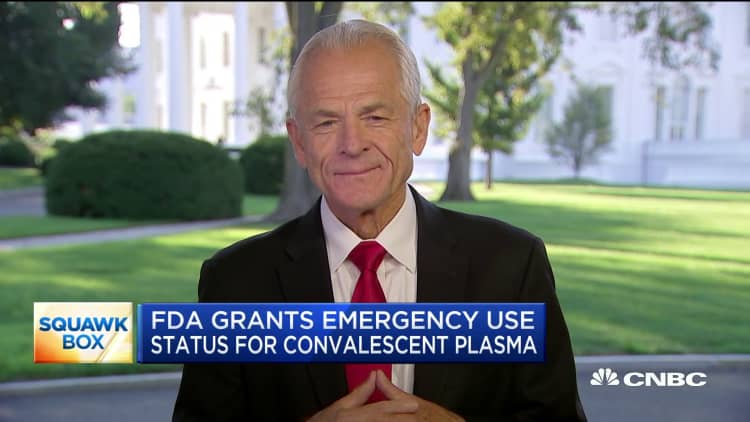The Trump administration on Sunday granted emergency authorization of convalescent plasma to treat hospitalized Covid-19 patients, despite concerns from some of the nation's top health officials that data from clinical trials is too weak to support widespread application of the treatment at this time.
The Food and Drug Administration said Sunday it was granting emergency authorization because it is reasonable to believe that convalescent plasma may be effective in treating Covid-19 patients, and the known and potential benefits outweigh the known and potential risks of such products.

"Today's action will dramatically expand access to this treatment," Trump said at a White House press conference on Sunday evening, a day before the start of the Republican National Convention. "We're removing unnecessary barriers and delays."
The convalescent plasma treatment uses blood from Covid-19 patients who have recovered and built antibodies against the virus and infuses it into people with the disease to prevent severe cases, according to the Mayo Clinic, which is conducting studies on the treatment.
Several top health officials including White House coronavirus advisor Dr. Anthony Fauci and Dr. Francis Collins, the director of the National Institutes of Health, have raised concerns about the data on the country's largest blood plasma study. Their concerns that the data was too weak prompted the FDA to put a hold on granting emergency use for the blood treatment.
Clinical trials have not proven whether plasma can help patients battle the coronavirus. An emergency authorization doesn't require the same amount of evidence for FDA approval. There are currently no FDA-approved drugs or vaccines against the coronavirus.
Blood plasma treatment has cut Covid-19 mortality by 35%, the president claimed on Sunday.
The results of the study by the Mayo Clinic that the FDA cited in its authorization of the treatment indicates that patients below age 80 who were not on a respirator and received plasma with a high level of antibodies within three days of diagnosis were about 35% more likely to survive another 30 days compared with patients who received plasma with a low level of antibodies. The study acknowledged, however, that its findings are limited, particularly because it did not have a placebo comparison.
"Given that the clinical evidence supporting this EUA was not obtained from prospective, well-controlled randomized clinical trials (RCTs), additional RCTs are needed," the FDA said. "Convalescent plasma should not be considered a new standard of care for the treatment of patients with COVID-19.
Trump reacted angrily to the FDA's decision to hold emergency authorization until more data is reviewed, saying last week that the decision may be politically motivated.
"I hear great things about it ... that's all I can tell you," Trump said during a previous White House press briefing. "It could be a political decision because you have a lot of people over there who don't want to rush things because they want to do it after November 3, and you've heard that one before."
Trump has claimed without evidence that the convalescent plasma has helped more than 50% of coronavirus patients who received the treatment.
The president in a tweet on Saturday made a baseless accusation that the FDA is delaying enrollment in clinical trials for Covid-19 vaccines or therapeutics because of political motivations.
Trump's pressure on regulators has drawn criticism from scientists and lawmakers who have warned that the president is pressuring regulators to deliver a vaccine before the Nov. 3 election, even if data from clinical trials do not support widespread use.
Dr. Peter Marks, director of the FDA's Center for Biologics Evaluation and Research, has vowed to resign if the Trump administration approves a vaccine before it is proved to be safe and effective.

"The FDA must approve drugs or vaccines based on their safety and effectiveness – NOT political pressure from the White House," House Speaker Nancy Pelosi tweeted on Saturday. "The President's dangerous attempt to inject himself into the scientific decisions of [U.S. FDA] jeopardizes the health & well-being of all Americans."
Former FDA chief Dr. Scott Gottlieb said Sunday the president's attack on the agency is related to convalescent plasma and warned that there are reasons officials are questioning it as a treatment.
"The trial that that's going to be based on, 70,000 patients, wasn't a very rigorously done trial. It was an open-label study where everyone got treated. So it's hard to draw conclusions," Gottlieb told CBS' "Face the Nation."
"I believe plasma is probably beneficial. It's probably weakly beneficial in the setting of this treatment. But I think some people wanted to see more rigorous data to ground that decision," Gottlieb continued. "And I think that's part of what is going on here with respect to that tweet and questions about the FDA decision-making."
— CNBC's Will Feuer contributed to this report.


